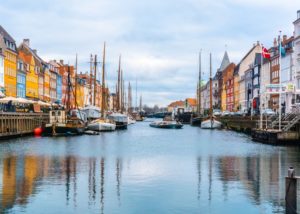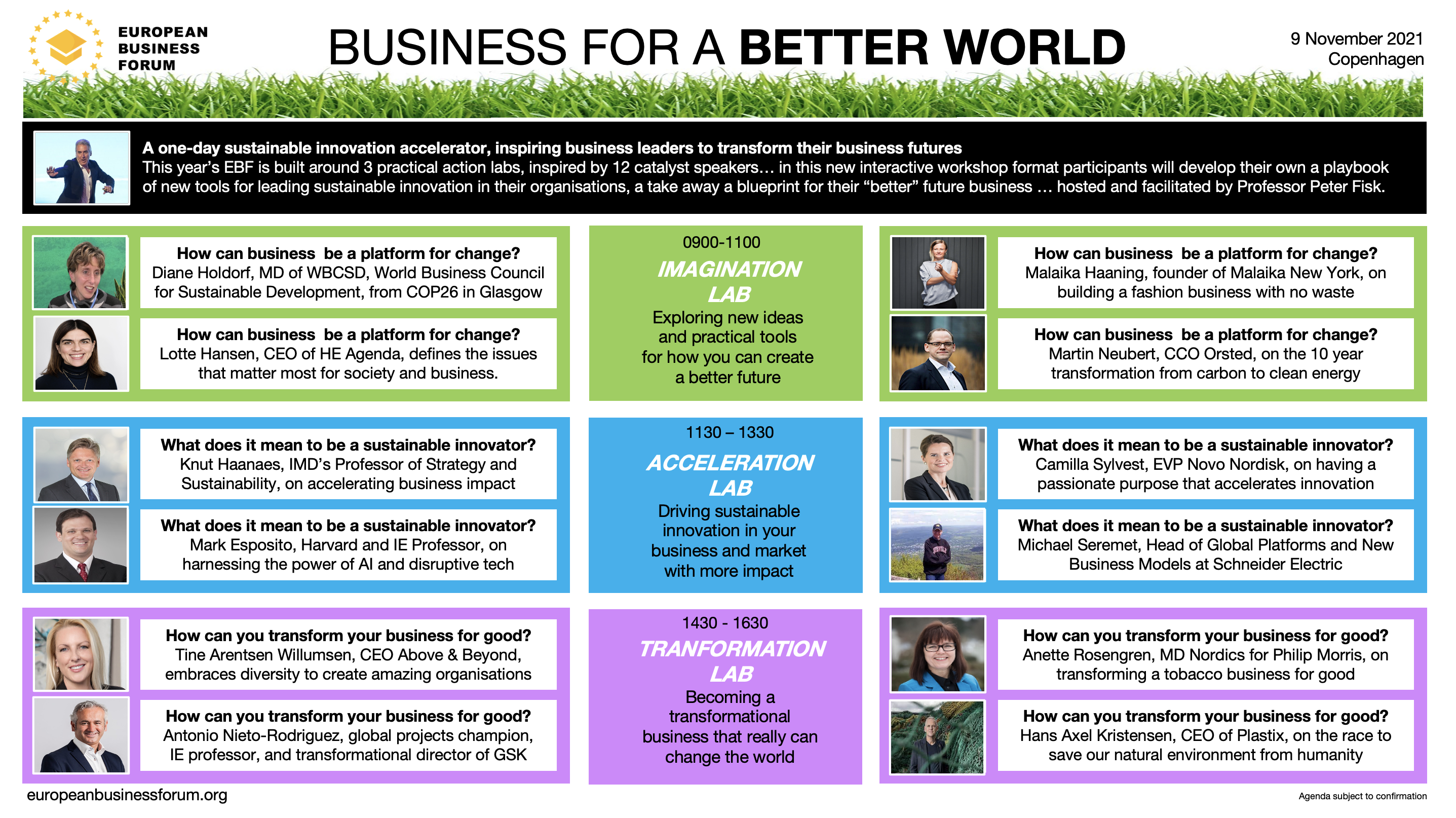European Business Forum 2021: Business for a Better World
November 9, 2021 at IDA, Kalvebod Brygge 31-33, Copenhagen, Denmark


“Business for a Better World”
How can we reimagine business as a positive force for good? How can we embrace the most difficult environmental and social challenges, as new opportunities to drive competitive advantage and enlightened progress?
Covid-19 has already become a catalyst for profound change in customer and investor mindsets. How can your business engage with these new agendas – reallocating capital and resources, accelerating decarbonisation, the new plastics economy, clean energy tech, digital healthcare, and consumer wellbeing?
EBF21 brings together business leaders and global thinkers to explore how organisations can think smarter, to address the big challenges of our time, in fresh and practical ways.
This is not just another conference. Instead it is
- a thought-provoking meeting of business minds, exploring new possibilities
- inspired by new global practices, and local case studies
- learning from each other, how we can act individually and collectively
- taking a practical workshop-style format, with expert catalysts
- working together to develop new business solutions for positive impact.
Denmark is already home to many of the world’s most sustainable companies, but how can we go further, better and faster? What can we learn from Europe, and beyond? How are start-up entrepreneurs creating new markets, and equally, how are corporate leaders driving innovation and transformational change?
EBF21 will build on the UN’s 17 SDGs, familiar to most of us, to also consider the new “Good Life Goals”, making the strategic initiatives more human and relevant – from equality and inclusion, to climate and oceans, health and wellbeing.
How can a better world not just be an idealistic challenge, but a strategic goal for every business? And how can this new thinking create a better business too?
Agenda

This year’s format is built around 3 practical action labs – bringing together a number of “catalyst” speakers, with their different ideas and perspectives, and then working together with the audience on a range of tools from the better business “playbook”. At the end of the three labs you will develop a new blueprint for your future better business.
So who are these catalytic speakers?
We kick off with a live report from COP26, the UN’s Climate Change Conference, where global leaders are meeting on the same day in Glasgow, to address the critical challenges of climate change, and greater action by the world. Diane Holdorf, from the World Business Council for Sustainable Development will open the EBF, and also talk about the their new “Transform” agenda.
Then, from New York, we’ll be exploring the exciting world of sustainable fashion with Malaika Haaning, who has a passion for beautifully designed clothing made with zero waste, and how this contrasts with a far more industrial business like Orsted.
The Danish energy business, of course, has been on an incredible journey in recent years, and was the 2020 “world’s most sustainable company”. Martin Neubert joins us to share Orsted’s journey, while Lotte Hansen defines what matters most right now.
Ultimately, this is a challenge of reimagining our businesses, and how they can help accelerate the shift to a better world. Sustainable innovation is therefore at the heart of any strategy to develop business for a better world. Harvard professor Mark Esposito will focus on how technologies can transform the way in which we address sustainable challenges.
https://www.youtube.com/watch?v=NN3YWhZaAwI
Novo Nordisk and Schneider Electric are two great sustainable innovators – from products and services to platforms and business models. Camilia Sylvester and Michael Seremet explain how it works, in Schneider’s case, making it the world’s most sustainable company in 2021.
The forum concludes with the challenge of implementation, how to make it happen in your business. Philip Morris has a fascinating challenge, to transform itself from a tobacco to a health business, a transformation from bad to good, you could say.
GSK’s head of projects, Antonio Nieto-Rodriguez, explains the secret of making sustainable transformation happen. And there are more great stories, for example like Plastix, les by Hans Axel Kristensen, which is cleaning the ocean’s of waste fishing nets to create beautiful new items, like sustainable clothing!
This is your wake-up call!
“Leaders of business. This is your wake-up call. You’ve been living on borrowed time. Raping the natural world of its resources, and leaving a toxic mess in its place. These weather patterns are not freaks, they are the world you have created. Blinding the man on the street with your superficial innovations and image. What about the sweatshops, the emissions, the packaging, the greed? It doesn’t look good”
Sustainability is the best opportunity for business to drive smarter innovation and profitable growth.
Covid-19 as the wake-up call
How has the recent pandemic challenged and heightened our thinking about these issues – purpose, sustainability, ESG and CSR, inequality, climate crisis and much more?
At the most fundamental level, Covid-19 has revealed three things:
1. Planet: Human activity is strongly related to climate change. The lockdown has resulted in rare sightings of blue skies from Beijing to Delhi, and worldwide CO2 emissions are predicted fell by 8% in 2020.
2. People: Covid-19 has been hailed as the “big equalizer,” but the reality is that we aren’t equally resilient as a society. Socio-economic status is strongly related to vulnerabilities of all sorts, with the poor and underprivileged in harm’s way to a disproportionate extent.
3. Profit: We cannot survive for long without economic activity and the creation of financial value. Millions of businesses are failing in the face of the pandemic and as many as 40% of businesses may not reopen after this disaster.
In essence, we need to manage climate-related risks, strengthen our social fabric and inspire economic activity that creates value for humankind if we are to create a world that is sustainable and well-equipped to combat impending crises.
So what will it take to achieve this symbiosis between people, planet and profit – also referred to as the “triple bottom line” – in contrast to the single bottom line of profit alone?
For starters, we must accept a basic truism: in a world of finite resources, maximizing private gain inevitably leads to collective loss – that is, the loss of common goods, a phenomenon known as the tragedy of the commons. For example if, in a bid to boost profits, global multinationals build and run factories but do not pay for the pollution they create, we get global warming. The collective is more important than the individual.
If Covid-19 has taught us anything about how to surmount our socio-environmental challenges, it is that each one of us – as individuals, companies or governments – needs to take ownership of our future. Being a bystander is no longer an option. Yet, if you’re like one of the thousands of executives I have encountered over the years, you likely believe that sustainability – that is, the wellbeing of our planet and its people – is important, but it’s “someone else’s problem”. In companies with a sustainability department, everyone points to that department as being responsible for everything sustainability-related.
Why is it that something as important as sustainability is given short shrift by so many in the corporate sphere? Over the past years, I’ve visited dozens of large, publicly listed companies and spoken with hundreds of employees to try to find out. I’ve been to head offices, mines, stores and factories, travelling from Madagascar to India to Chile’s Atacama Desert.
1. Find more purpose
To take ownership of our post-pandemic future, businesses must start by asking the all-important question of corporate purpose – or “why do we do what we do”? Leaders must articulate how the firm creates value for all stakeholders, not just shareholders, and accept that profit is the consequence of such value creation. This process of defining purpose makes it clear that businesses exist to serve society and not the other way round, and the link to sustainability becomes clear. As Paul Polman, ex-CEO of Unilever, said: “Sustainability is totally driven by purpose. It starts with the overall firm belief that we are here to serve society … and only by doing that well, we can make all our stakeholders, including our shareholders, happy.”
How can leaders discover that “true north” – their company’s purpose? Often, it happens via epiphanies or first-hand experience on the front lines. Francesco Starace, the CEO of Enel, one of the largest energy companies in the world, had his epiphany while working in the Middle East in the mid-1980’s. He realized that an energy company’s job was not to foist new habits on people, but rather to enable them to do what they wanted to do in the first place. Crossing an emotional barrier, as Starace did in the 1980s, and identifying with a company’s purpose in a new and personal way enables leaders to build their own sense of sustainability ownership and address the critical problems of our world. “Sooner or later,” as Starace told me, “you have to face up to the facts about why you do what you do.”
2. Engage all stakeholders
Armed with a sense of purpose and a set of concrete sustainability goals, your company is ready to create motivation and ability among your stakeholders, and to help integrate those sustainability goals into their daily work routines.
Market sustainability to stakeholders as an opportunity to contribute to the future wellbeing of the company and the world. To entice employees and other stakeholders to engage in sustainability, appeal sometimes to the head (this is the smart thing to do), other times to the heart (right thing to do), and often both. Lisa Jackson, vice president of environment, policy and social initiatives at Apple told me: “The easiest and most fun part of sustainability is when you can go to the business – as we have done now several times – and say, ‘It will save you money to reduce the amount of scrap metal that is produced. It will save you money to think about packaging in a different way’.”
Alongside motivation, you also have to create the ability to act sustainably. Increase the capability of your workforce by putting systems, structures and training in place that make it easier to act sustainably. Give your stakeholders the tools, confidence and freedom they need. In a word, make sustainability everybody’s job. “If there’s one exception, everyone thinks they’re the exception,” said Keith Weed, Unilever’s chief marketing officer and head of sustainability at the time.
3. Achieve more together
Form broader industry collaborations to address complex problems. Such collaborations, often with traditional competitors, help create the systemic changes that our planet and its people need – and that businesses need, too. “If everything fails around us, we fail too,” said the chief sustainability officer of Marks & Spencer.
Topics such as deforestation, effluent in waterways, or buying minerals from the Congo can only be addressed by a consortium, in which each party, again, needs to rise above self-interest and think about the wellbeing of the collective. Paul Polman has been quick to point out: “We don’t have the right level of cooperation at the global governance level to deal with these issues, and I hope that the business community will step up and fill that void.”
Watching the pandemic unfold before us and seeing both the healing effects of our slowed economic activity on the skies and our planet as well as the horrific plight of our fellow human beings, leaves most of us “uncomfortably numb” and yearning to do something about securing the future. Issues such as global warming, inequality and poverty – as outlined in the SDGs – are gaining urgency. Taking ownership of addressing such issues should form the new leadership mandate.
As a preview, here’s what happen in previous EBFs …
https://www.youtube.com/watch?v=kdCLUbml9q8&t=6s
https://www.youtube.com/watch?v=VJBNVfRvm0I
Join us at this year’s European Business Forum.
Find out more and book >